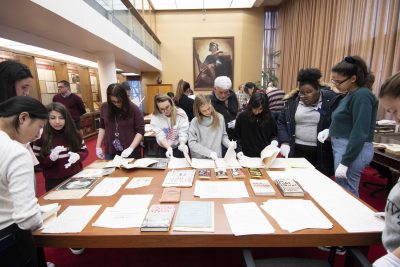
Letters between Julius and Ethel Rosenberg, a couple convicted of conspiracy to commit espionage for the Soviet Union, laid beside documents from infamous criminals such as James “Whitey” Bulger in Mugar Memorial Library last Tuesday.
The BU community was given the opportunity to take a behind-the-scenes look into the stories of high profile crimes and murders through letters, manuscripts and journals from both criminals and law enforcement at a “True Crime” discovery seminar at Boston University’s Howard Gotlieb Archival Research Center.
Ryan Hendrickson, HGARC assistant director for manuscripts, and Dick Lehr, a College of Communication journalism professor, led the exploration of the documents. Hendrickson said he chose this topic for the seminar in hopes that it would attract many students due to the current popularity of true crime stories.
“I suspect [the popularity] is because [crime] combines mystery, suspense, horror and often absurdity,” Hendrickson said. “It acknowledges the often frightening nature of modern life, while also making that fear into a narrative that can be understood and processed.”
The “True Crime” seminar is one of a series of Student Discovery Seminars offered by the HGARC. Hendrickson said the center’s archivists often rely on the expertise and vast knowledge of BU professors to compel students to come learn about a new topic.
“I looked first for what we actually had in the collections since that’s what I’m limited to using,” Hendrickson said. “Within that, I tried to find material that would be of local interest, like Lizzie Borden and ‘Whitey’ Bulger, or historical interest or just cool to see firsthand.”
Lehr’s own experience working as a legal affairs reporter for The Boston Globe led him to follow local crime extensively, especially that of crime boss “Whitey” Bulger, he said. The HGARC has long had archives of Lehr’s work, so the seminar focused on some of his notable stories, especially those about “Whitey” Bulger, according to Lehr.
Despite Lehr’s expertise in crime coverage, he said he had little involvement in the organization of the exhibits and its themes, making the seminar just as interesting to him as it was to students.
“It was fascinating the way they set it up.” Lehr said. “Each table was organized around different themes of crime like organized crime, historic crime and crime in prison. I couldn’t speak on a lot of these crimes besides organized crime, I didn’t know much myself, so I found myself interested and wandering around.”
Magdalena Brown, a sophomore in the Wheelock College of Education and Human Development who attend the seminar, said she heard about it from one of her roommates.
“I have always been a fan of true crime and am an avid watcher of all of the true crime documentaries on Netflix,” Brown said, “and thought that it would be exciting to have a hands-on experience.”
Unexpectedly, the most compelling parts of the seminar weren’t necessarily the most gruesome, Brown said. There wasn’t an emphasis on the grisly details of crime, but rather, the seminar showed the psychological causes and effects of each of the crimes by using memos, depositions and letters from each case.
“I was drawn towards the case of the Rosenbergs,” Brown said. “The letters written back and forth from husband and wife Julius and Ethel Rosenberg were heartfelt and heartbreaking, and I found myself choked up with emotion after finishing skimming through the book of the letters written between the husband and wife duo.”
Brown said the seminar made her and other students more aware of resources they have at their fingertips.
“I would be interested in attending another seminar like this one because it brought my attention to a new, interesting side of true crime,” Brown said, “as well as introducing me to a whole set of resources that I was not even aware that BU possessed and were available to me.”
The “True Crime” seminar may even inspire students to spend their own time researching the archives and learning more about the intricacies of crime and punishment, Hendrickson said.
“I hope [the seminar] spurred [students] to think about how the categories of ‘crime’ and ‘criminal’ function in our society, who decides what a crime is and how it should be punished,” he said. “The US has the largest incarcerated population of any nation on earth right now, and has for quite a while.”























































































































